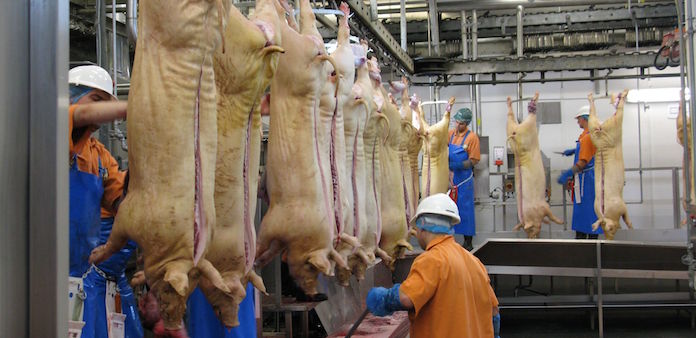Farming industry leaders have expressed serious concerns about how the Government’s future immigration policy could hamper the UK’s ability to produce food.
Setting out a new points-based system from January 2021, the Home Office said it was ending free movement and would ‘not implement a route for lower-skilled workers’. This means visas would not be awarded to workers requiring qualifications equivalent to below an A-level or to be paid less than £25,600 per year.
But the ‘most highly skilled’, who can achieve the required level of points, will be able to enter the UK without a job offer if they are endorsed by a relevant and competent body.
Under the system, which will kick when the Brexit transition period ends on December 31, EU and non-EU citizens coming to the UK would be treated equally.
The Home Office is urging employers to ‘move away’ from their reliance on ‘cheap labour’ from Europe and invest in retaining staff and developing automation technology. Home Secretary Priti Patel has suggested that employers should try and recruit from the eight million ‘economically inactive’ potential workers in the UK – although it has been pointed that these include students, retired workers and people who physically cannot work – or through new routes for high-skilled migrants.
New Defra Secretary George Eustice has announced the Government will quadruple the number of seasonal workers to 10,000 workers in 2020 under the Seasonal Workers Pilot, but this will largely help the horticulture sector snd will not go far enough in that, according to industry leaders.
Industry reaction
The NPA said the proposals represent a major risk to British food production.
NPA chief executive Zoe Davies said: “We have been consistently warning Government for past 4 years that the UK needs access to a labour market that allows pig producers and allied industries to grow.
“As our surveys with members have shown, permanent labour from the EU has been a vital part of the pig production workforce, and drives to actively bring it down will have significant impacts on businesses.
“Agriculture is strategically important. We have an Agriculture Bill going through Parliament that explicitly underlines the importance of food security; if we are to source more food from the UK then we need to have the workforce to supply it. As it stands, one Defra’s approach to food production is entirely at odds with the Home Office’s.”
NFU President Minette Batters said: “We have said repeatedly that for farm businesses it is about having the full range of skills needed – from pickers and packers to meat processors and vets – if we are to continue to deliver high quality, affordable food for the public. Failure to provide an entry route for these jobs will severely impact the farming sector.
“Automation will have a vital role to play and we fully support investment in this area, but it is not yet a viable option to replace the number of people we need and farmers will need a practical solution in the meantime. There are also some jobs that simply cannot be replaced by technology.
“There are several issues within this proposed policy that need addressing, not least the incredibly short timeframe given for businesses to prepare, and we will be contributing to any consultation to ensure the views of Britain’s farmers are heard.”
The British Veterinary Association said the new immigration rules were a mixed bag for the veterinary profession. Every year over half of new entrants onto the UK veterinary register are from overseas, with the vast majority coming from the EU via freedom of movement
BVA president Daniella Dos Santos said: “The government’s blueprint for trade will require a massive boost to the veterinary workforce to deliver veterinary certification not only for exports but, as announced last week, also for imports.
“This new immigration system leaves a big question mark over whether we’ll be able to fill the workforce gap created by the end of free movement when we are already struggling to recruit and retain vets.
But she said the BVA was pleased that its campaign to secure vets onto the Shortage Occupation List will be rewarded under the new system and ‘delighted’ that post-study work visas will be available for vets who graduate from our world-class vet schools.




